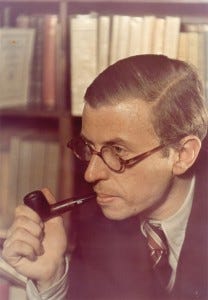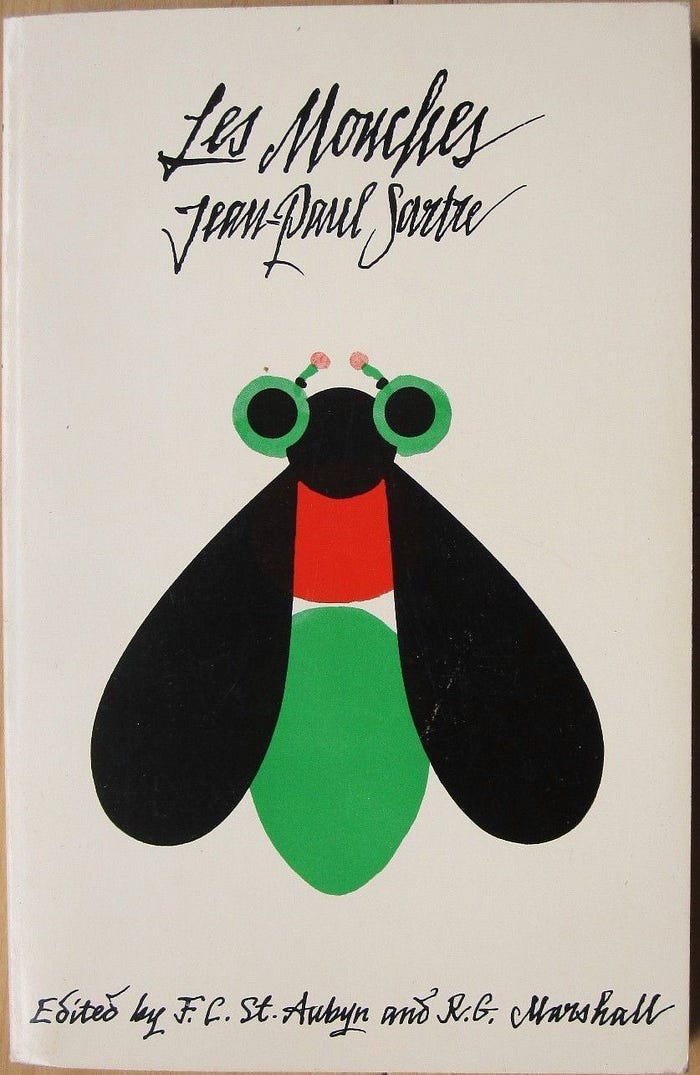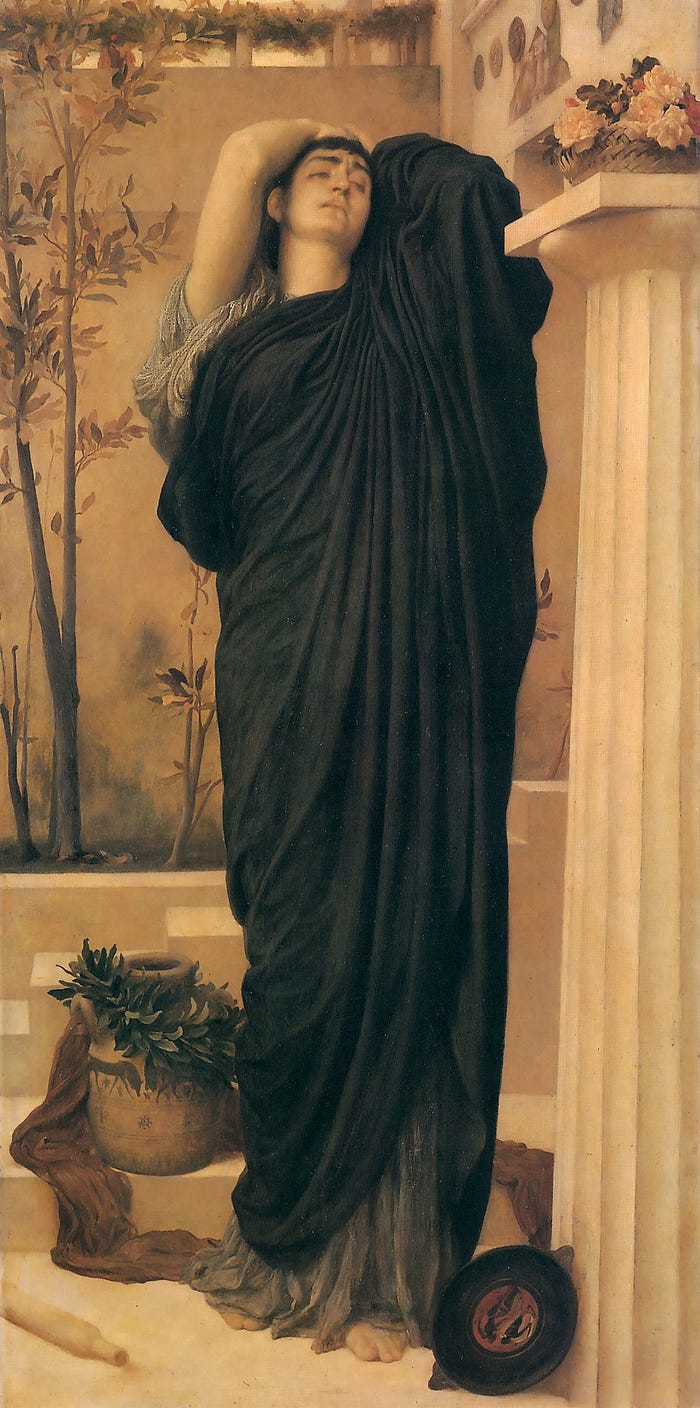Decoding Jean-Paul Sartre’s The Flies
Condemned to freedom
Mere being and nothingness
I emerge from choice
- Terence Green
Much like Jean Anouilh’s adaptation of Antigone, Sartre’s first play, Les Mouches (The Flies), subtly intended to send a message of resistance to the Nazis and the importance of free will. It was first performed on 3rd June 1943 with the permission of the German censorship authorities at the Théâtre de la Cité in Paris. Having acquainted himself deeply with Greek mythology while teaching Charles Dullin’s (whose company managed the play and performance) students, Sartre based the plot on the legend of Orestes, who returns to his native city of Argos and avenges the death of his father, Agamemnon by murdering his uncle, Aegis and his mother, Clytemnestra.

A renowned existentialist, at the center of modern philosophy, Jean-Paul Sartre was also active as a political figure protesting in the student’s revolution of 1968. He produced a massive amount of prose during his lifetime and this is perfectly phrased by Annie Cohen Solal as “more than forty works in less than four years”. He experimented with a variety of genres including essays, magazine and journal articles, plays, radio broadcasts, reports, novels, etc. on themes of philosophy, politics, ethics, aesthetics, literature, etc. The Flies is a complex play that touches upon multiple themes and issues relevant to the time (and perhaps, even today) in which Sartre wrote the play.
The first act is concerned with Orestes’ arrival into Argos with his Tutor and his encounter with Zeus as well as his own sister, Electra and Clytemnestra, his mother. The themes in the first act had an immediate significance for the audience who saw the play at that time. The Vichy government would tell the people that the defeat of 1940 was inevitably a punishment for the ‘French way of life’ which according to them represents frivolity and godlessness and that they must be ready to atone for their sins. Their policy received, in part, the support of the Roman Catholic Church which was represented in The Flies as religion collaborating with the temporal powers in Argos in order to maintain the ‘moral order’ which was the motto of the Vichy regime. In fact, Orestes’ discontent with the cosmopolitan education he had received and the way it distanced himself from his native country, reflected Sartre’s view that the intellectual must take sides, when Orestes says,
“What do I care for happiness? I want my share of memories, my native soil, my place among the men of Argos.” (Sartre 49).
The first act introduces the main political theme of the play. Orestes, the frontman of the Resistance movement, will kill both Aegisthus, the German invader and Clytemnestra, the French collaborator who accepted the invader and invited him in. The political message of The Flies is clear as day — to fight not only against the German invader but also the French collaborator and to not drown in remorse for committing what the powers that be consider a crime. Do not give in to the lying propaganda to join forces in the name of a primitive religion. When the common man realises his freedom, that is when tyranny is doomed to fail. This political enthusiasm reflects the enthusiasm of the left-wing intellectuals.
The second and third acts emphasize greatly, on the philosophical aspects of the play. On the Feast of the Dead, Electra denounces the ceremony as a sham by wearing white coloured apparel and exclaims that men are made to be happy and not live in miserable repentance of their sins.
“The sun is shining. Everywhere down in the plains men are looking up and saying: “It’s a fine day,” and they’re happy. Are you so set on making yourselves wretched that you’ve forgotten the simple joy of the peasant who says as he walks across his fields: “It’s a fine day”? No, there you stand hanging your heads, moping and mumbling, more dead than alive.” (Sartre 45).
Orestes’ reflection on whether he should leave Argos and carry on with his life is the real turning point of the play. He understands that he alone can give meaning to the sign he asked for; which Zeus fulfils so that Orestes leaves Argos. A feeling of liberty and the freedom to choose his own path dawns upon him and he realizes that he can choose the path which will lead him to avenge his father’s murder and to live rightfully among the people of Argos. The last act emphasizes the developed difference between Orestes, a free man who accepts the consequences of what he has done, a reflection of Sartre’s idea of good faith, and Electra, the one who is not prepared to assume responsibility for what she has always dreamed of. Orestes decides to carry the burden of not only his own crimes but also the guilt of the people of Argos. The traditional departure of Orestes from Argos, in which he tries to run away from the wrath of the Furies, is changed into the conscious assumption, by a free man.
Much like the lecture that Sartre delivered in 1945 called Existentialism is Humanism, The Flies contains most of the positive ethical doctrines associated with Sartre’s form of existentialism.
“Man is free and there are no ready-made values ‘written up in the clear heavens’ to guide him in the moral choices which he has to make.”
Each man must choose what to do like Orestes has to regarding whether he must leave for Sparta or stay in Argos, to let Aegisthus walk scot free or to kill him. No man can be commanded by a sign to do something for he himself, ascribes meaning to it, a decision he makes himself in isolation and anguish. His existence, for the liberty of man makes him independent of the God who created him and is illustrated in Orestes’ conversation with Zeus where he says,
“What have I to do with you, or you with me? We shall glide past each other, like ships in a river, without touching. You are God and I am free; each of us is alone, and our anguish is akin.” (Sartre 66).
To Sartre, the discovery of liberty is not a thing of joy, but the realisation of one’s own abandonment and isolation. The only valid choice that one could make is that which will lead oneself and others to greater freedom.
A motif that imposes itself from the very beginning of the play is an irresistible desire for realization, a thirst for incarnation. Orestes, who had breathed the rarefied air of an intellectual upbringing, passionately seeks the proximity of sensuous life and things. (Spoerri 55). The growing concreteness of things which results from the repeated contrasting of his attitudes of a detached spectator and passionate participants is only the exterior mark of the stabilisation of personality expressed in the protagonist. It is in his clash with other characters, that the man who shapes himself emerges even more distinctly. The others are in one way or another unbalanced in the structure of their existence. In contrast to the false spirituality of the tutor and the bewildered vexations of the bigoted masses, Orestes finds the road to total existence through a voluntary acceptance of guilt and destiny.

The flies are symbolic of the oppressive atmosphere throughout the play. In this swarm, feeding on dirt and carrion are the murky secretions of the soul, the guilt that one would wish to repress but which clings to man like a sticky substance. The theme of The Flies is dreadfully embodied in the beginning of the play. Moreover, in a chapter called Existential Psychoanalysis from Sartre’s Being and Nothingness, he discusses at length the meaning of ‘the viscous’. He demonstrates that the viscous is a state intermediate between solid and liquid. Life, to him could be considered as a viscous mass. It is flowing but with time begins to solidify. It is annoyingly ambivalent. It is resistant yet cannot be seized. Such is the manner in which reality appears to a man who no longer can flow freely; in whom the sap of life slowly and steadily thickens and enters the realm of decay. The slimy existence, this ‘’pitch-like filth” as Erich Brock would call it in his essay, “Philosophy in the Literary work of Jean-Paul Sartre” is for Sartre, the basic form of existence. And to this decaying matter, flies are attracted. The disturbing imagery as described by the Furies is representative of this.
“We shall settle on your rotten hearts like flies on butter; Rotten hearts, juicy, luscious hearts. Like bees, we’ll suck the pus and matter from your hearts, and we’ll turn it into honey, rich, green honey.” (Sartre 60).
The world of viscosity appears in images such as ‘heads burst open, faces like’ squashed raspberries’, ‘putrefied eyes’, the beard of Aegisthus which runs like ‘a legion of spiders from ear to ear’ so does the world of the solidified mind appear in the metallic and mineral images, meant to evoke abstractions. Ideas are “beautiful and hard as steel”, Clytemnestra talks of guilt as “dark and pure like a black crystal”. Furthermore, Jupiter speaks of the harmony of the spheres as an “énorme chant de graces minérales”. The dismal description of Argos is also indicative of the action yet to come.
“In a locale where plague reigns supreme, flies scourge guilt ridden humans, sordid imagery haunts the milieu, saviours need somewhere to belong to and sadistic gods seek hideouts to eavesdrop, Sartre’s version of the Electra Myth comes to life” (Cheema 113).
One might ask why Electra, who in Jean Giraudoux’s most successful play appears strong, pure and incorruptible, breaks down and is untrue to herself here. She embodies false overexcitedness and retracts from her plan after her mother’s death. Electra might represent the traditional weak woman as men would imagine it. Electra has consumed her individual existence in narrow-sighted human relationships. She has become helpless by denying herself and thus, falls for the psychological manipulations of Jupiter. (Theophil 57). The world darkens for Electra once the deed is done, with the hellish dance of the Furies around her fearful soul. Electra becomes, as Clytemnestra prophesies from the very beginning, the precise image of her mother.

‘Abandonment’ for Sartre, means abandonment by God, but that doesn’t mean that Sartre, an atheist believed in God as a metaphysical entity. Instead he echoes, one of his biggest philosophical inspirations, Nietzsche in his famous pronouncement, ‘God is dead’, signified the decline of the social belief in God. A negative word like ‘abandonment’ emphasizes the sense of loss caused by the realisation that there is no God to warrant our moral choices and no promise of a day of judgement which means that we are left with no guidelines to attain salvation. This is reflected in The Flies when Orestes tells Zeus, “Justice is a matter between men, and I need no God to teach me it”. Sartre thus developed his theory regarding the implications of freedom and the consequential state of anguish.
The Flies is a call to people to recognize their freedom, an important theme of existentialism as proposed by Sartre.
“Once freedom lights its beacon in a man’s heart, the gods are powerless against him” (Sartre 57).
In The Flies, the protagonist acts first; his personality as a character is created after the action. The protagonist in the theatre of real life situations, is the person who has the responsibility to create meaning in an absurd world and to create his own meaning of life. He could either accept his responsibility and make authentic choices in the extreme situations in which he finds himself, or deny the responsibility and fall into bad faith. His choice is free from moral sanction, but the choice must be true to himself. Moral quality and personality is not revealed but created in the situations when the protagonist makes an authentic choice.
